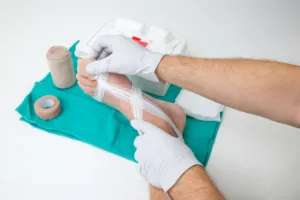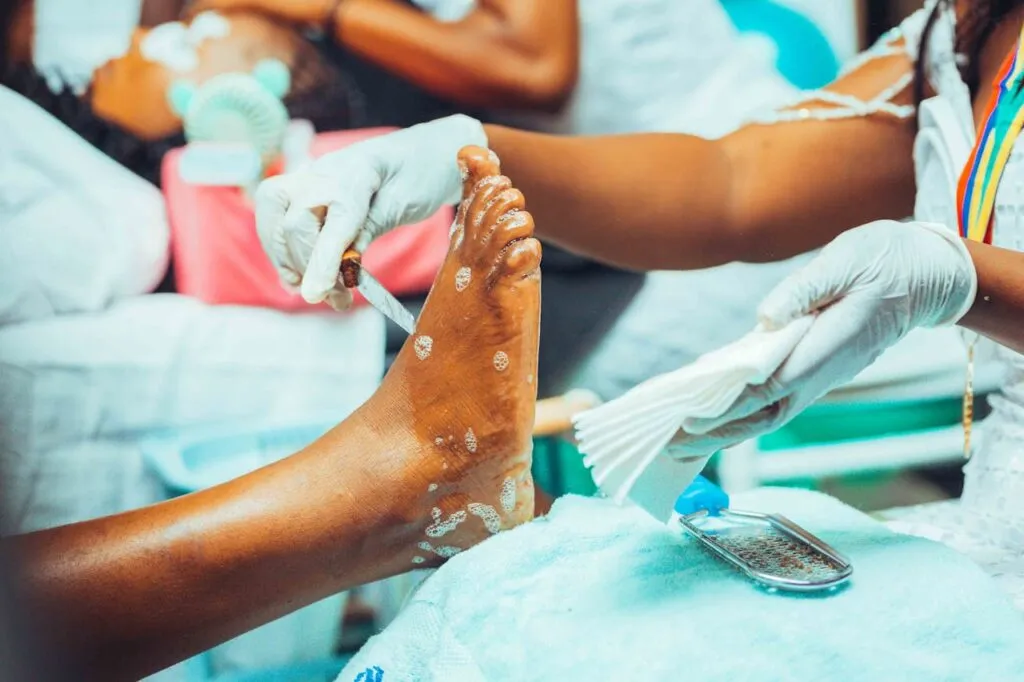The Benefits of Outpatient Wound Care Services
Imagine this: You’re enjoying a sunny day, tending to your garden, when suddenly, a misstep leads to a deep cut on your leg. You clean it up, slap on a bandage, and think nothing more of it. Days pass, but instead of healing, the wound becomes red, swollen, and increasingly painful. Now, you’re faced with a decision—do you tough it out at home or seek professional care? This is where outpatient wound care services come into play, offering specialized treatment that can make all the difference.
Outpatient Wound Services: Convenient and Specialized Care
Outpatient wound care services are designed to provide expert treatment without the need for hospital admission. This means you can receive specialized care while maintaining your daily routine—a win-win situation. These services cater to various wounds, from diabetic ulcers to surgical incisions, ensuring that each receives the attention it deserves.
Wound Care Specialists: The Experts You Need
When it comes to healing complex wounds, not all heroes wear capes; some wear lab coats. Wound care specialists are medical professionals trained specifically in the art and science of wound healing. Their expertise allows them to assess your wound thoroughly, develop a personalized treatment plan, and monitor your progress closely. This specialized attention can significantly speed up the healing process and reduce the risk of complications.
Wound Healing: A Journey, Not Just a Destination
Healing is more than just closing a wound; it’s about restoring function and quality of life. Outpatient wound care centers utilize advanced therapies and technologies to promote efficient healing. These may include specialized dressings, negative pressure therapy, or even bioengineered skin substitutes. By addressing the underlying causes and providing targeted treatments, these centers help transform a slow-healing wound into a success story.
A Real-Life Example: Advanced Therapies at Work
Consider the case of Mr. Thompson, a diabetic patient who developed a non-healing ulcer on his foot. Traditional treatments weren’t effective, and amputation seemed imminent. However, after visiting a specialized wound care center, he received advanced therapies that promoted healing, ultimately saving his foot. This is just one example of how specialized care can make a profound difference.
The Bigger Picture: Cost-Effectiveness and Quality of Life
Investing time in outpatient wound care services isn’t just about healing faster; it’s also about being cost-effective. Proper wound management can prevent hospital readmissions and more severe health issues down the line, saving both time and money. Moreover, effective wound healing significantly improves quality of life, allowing individuals to return to their daily activities without pain or worry.
In conclusion, outpatient wound care services offer a specialized, convenient, and effective approach to treating complex wounds. By entrusting your care to wound care specialists, you’re not just treating a wound; you’re investing in a smoother, quicker recovery and a return to the life you love.
Understanding Outpatient Wound Services
Outpatient wound services are specialized medical facilities dedicated to the assessment, treatment, and management of various types of wounds without requiring hospital admission. These centers cater to patients suffering from chronic wounds, surgical wounds, traumatic injuries, burns, and ulcers, among others. The primary goal is to provide comprehensive care that promotes effective healing while allowing patients to maintain their daily routines.
The Importance of Specialized Wound Care
Why Specialized Wound Care Matters
Wounds that fail to heal properly can lead to severe complications, including infections, loss of function, and, in extreme cases, amputation. This is particularly concerning for individuals with underlying conditions such as diabetes, vascular disease, or compromised immune systems. Specialized outpatient wound care centers, like Optimum Wound Care Center (OWC Center) in Louisville, KY, are designed to provide advanced treatment options that significantly improve healing outcomes and prevent life-threatening complications.

The Risks of Improper Wound Healing
When wounds are not managed effectively, they can result in:
- Chronic infections – Persistent wounds create an environment for bacteria to thrive, increasing the risk of systemic infections like cellulitis or sepsis.
- Tissue damage and necrosis – Delayed healing can lead to dead tissue, making amputation a necessary intervention in severe cases.
- Loss of mobility and function – Untreated wounds, especially on the feet or lower extremities, can impair movement and reduce quality of life.
- Increased healthcare costs – Complications from poorly managed wounds often result in repeated hospitalizations and expensive treatments.
The Role of Specialized Outpatient Wound Care Centers
Specialized wound care centers are equipped with the expertise and resources necessary to address these challenges effectively. At OWC Center, we offer a multidisciplinary approach that includes:
1. Comprehensive Patient Assessment
Each patient undergoes a thorough evaluation to determine the underlying causes of their wound and assess factors such as circulation, infection risk, and overall health status. This allows for a highly personalized treatment plan.
2. Advanced Treatment Modalities
Specialized wound care involves state-of-the-art therapies designed to accelerate healing, including:
- Negative Pressure Wound Therapy (NPWT) – A vacuum-assisted closure system that removes excess fluid and promotes tissue regeneration.
- Hyperbaric Oxygen Therapy (HBOT) – Used to increase oxygen supply to tissues, reducing the risk of infection and enhancing healing.
- Wound Debridement – The removal of dead tissue to prevent infection and promote new tissue growth.
- Bioengineered Skin Substitutes – Artificial skin grafts to help close chronic wounds, particularly in patients with diabetic foot ulcers.
3. Multidisciplinary Collaboration
At OWC Center, our team of wound care specialists, physicians, nurses, and physical therapists work together to provide a holistic treatment approach. This team effort ensures that all aspects of wound healing are addressed, including infection control, circulation improvement, and nutritional support.
4. Customized Care for Chronic Wounds
Patients with diabetic ulcers, pressure injuries, venous stasis ulcers, and surgical wounds require targeted care strategies. Our team creates individualized care plans based on the wound’s severity, location, and the patient’s medical history to ensure optimal recovery.
5. Preventative Education and Long-Term Management
A crucial part of specialized wound care is patient education. At OWC Center, we provide guidance on:
- Proper wound cleaning and dressing techniques
- Nutrition and lifestyle changes to support healing
- Offloading techniques to reduce pressure on wounds
- Recognizing early signs of complications
Key Benefits of Outpatient Wound Care Services
- Access to Advanced Treatments
Outpatient wound care centers utilize state-of-the-art technologies and therapies to enhance the healing process. These may include:- Negative Pressure Wound Therapy (NPWT): This technique involves applying controlled suction to the wound area, promoting faster healing by removing excess fluids and stimulating tissue growth.
- Hyperbaric Oxygen Therapy (HBOT): Patients breathe pure oxygen in a pressurized chamber, increasing oxygen concentration in the blood and enhancing the body’s natural healing abilities.
- Bioengineered Skin Substitutes: These are artificial or biological materials used to cover and protect wounds, facilitating tissue regeneration.
- Comprehensive Wound Assessment
Wound care specialists conduct thorough evaluations to determine the underlying causes of non-healing wounds. Factors such as poor circulation, infection, or underlying medical conditions like diabetes are identified and addressed, ensuring a holistic treatment approach. - Personalized Treatment Plans
Each patient’s condition is unique, and so is their treatment plan. Outpatient wound care services develop individualized strategies that may include debridement (removal of dead tissue), specialized dressings, compression therapy, and lifestyle modifications to promote optimal healing. - Patient Education and Support
Educating patients about proper wound care techniques, nutrition, and preventive measures is a crucial aspect of outpatient services. Empowered with knowledge, patients can actively participate in their healing process and reduce the risk of future wound complications. - Enhanced Quality of Life
Effective wound management not only accelerates healing but also significantly improves a patient’s quality of life. By reducing pain, preventing infections, and restoring mobility, outpatient wound care services enable individuals to resume their daily activities with confidence.
The Role of Wound Care Specialists
Who Are Wound Care Specialists?
Wound care specialists are healthcare professionals with advanced training in the assessment, diagnosis, and treatment of complex wounds. They play a vital role in managing acute and chronic wounds, ensuring faster healing, reducing complications, and improving the overall quality of life for patients.
These specialists include:
- Physicians (MDs, DOs) – Trained in wound management and often specializing in dermatology, surgery, or internal medicine.
- Nurse Practitioners (NPs) and Physician Assistants (PAs) – Provide direct patient care, including debridement, prescribing medications, and coordinating treatment plans.
- Certified Wound Care Nurses (CWCNs, WOCNs) – Specialize in wound, ostomy, and continence care, focusing on dressing changes, infection control, and patient education.
- Physical Therapists (PTs) and Occupational Therapists (OTs) – Assist in wound healing by improving mobility, circulation, and rehabilitation after injury.
Why Are Wound Care Specialists Essential?
1. Expertise in Chronic and Acute Wounds
Not all wounds heal the same way. Wound care specialists are trained to treat a variety of wounds, including:
- Diabetic ulcers – Preventing complications like infections and amputations.
- Pressure injuries (bedsores) – Managing wounds caused by prolonged immobility.
- Venous and arterial ulcers – Addressing circulation issues that affect healing.
- Surgical wounds – Ensuring proper post-operative healing to prevent complications.
- Traumatic injuries and burns – Providing specialized care for skin regeneration.
2. Advanced Treatment Techniques
Wound care specialists utilize cutting-edge treatments to accelerate healing, including:
- Negative Pressure Wound Therapy (NPWT) – Uses suction to promote healing.
- Hyperbaric Oxygen Therapy (HBOT) – Increases oxygen supply to the wound to enhance recovery.
- Biologic Dressings & Skin Substitutes – Uses bioengineered tissues to promote healing in chronic wounds.
- Advanced Debridement Techniques – Removes dead tissue to stimulate new growth.
- Compression Therapy – Improves circulation for venous ulcers.
3. Personalized Wound Management Plans
Each wound requires a tailored approach. Specialists assess:
- The type and severity of the wound
- Underlying health conditions (such as diabetes or vascular disease)
- Infection risks and treatment strategies
- Nutritional needs to support healing
- Patient mobility and lifestyle factors
4. Preventing Complications & Reducing Hospitalizations
Without proper treatment, wounds can lead to severe complications such as infections, sepsis, or amputations. Wound care specialists help prevent:
- Chronic non-healing wounds that require long-term treatment.
- Infections that can spread and lead to severe health risks.
- Hospital readmissions due to complications.
5. Patient Education & Long-Term Care
Empowering patients with knowledge is a crucial part of wound care. Specialists educate on:
- Proper wound cleaning and dressing changes
- Lifestyle modifications to promote healing
- Preventive measures for at-risk individuals
- When to seek emergency care
Don’t let a slow-healing wound affect your quality of life. Trust the experts at OWC Center in Louisville, KY, for advanced, compassionate wound care. Contact us today to schedule your consultation and start your path to faster healing!
Key Takeaways
- ✅ Outpatient Wound Care Offers Personalized, Specialized Treatment – Outpatient wound services provide individualized care tailored to your specific wound type, ensuring faster and more effective healing. With access to experienced wound care specialists, you receive advanced treatments without long hospital stays, promoting comfort and convenience.
- ✅ Faster Healing with Advanced Wound Care Techniques – Specialized outpatient clinics utilize state-of-the-art technology, including negative pressure therapy and bioengineered dressings, to enhance wound healing. These evidence-based treatments reduce complications, minimize infections, and support long-term recovery.
- ✅ Convenient and Cost-Effective Care – Outpatient wound services allow you to receive high-quality treatment without hospital admission, reducing medical costs and avoiding unnecessary stays. Flexible scheduling ensures minimal disruption to your daily life while providing expert care close to home.
- ✅ Comprehensive Support from Wound Care Specialists – At an outpatient center, wound care specialists work closely with you to manage underlying health conditions, provide education, and develop long-term prevention strategies. Their compassionate approach ensures you feel supported every step of the way.
- ✅ Lower Risk of Infection and Complications – Regular monitoring and expert care in an outpatient wound care setting significantly lower the risk of infections, hospital readmissions, and chronic wound complications. Timely interventions help prevent serious issues and improve overall healing outcomes.
Related Questions Asked and Answered
1. What Types of Wounds Benefit from Outpatient Wound Care?
Outpatient wound care is ideal for a wide range of conditions, including:
- Diabetic Foot Ulcers – Specialized treatments help prevent infections and complications.
- Pressure Injuries – Customized care plans promote healing and prevent worsening.
- Surgical Wounds – Proper post-op wound management ensures smooth recovery.
- Vascular Ulcers – Compression therapy and blood flow improvement reduce healing time.
- Traumatic Wounds – Burns, lacerations, and other injuries heal faster with expert care.
Many of these conditions require ongoing treatment, making outpatient wound care services the perfect solution for effective, long-term management.
2. How Does Outpatient Wound Care Improve Healing Time?
Outpatient wound care enhances healing through:
- Early Intervention: Prompt assessment and treatment prevent complications.
- Specialized Techniques: Negative pressure wound therapy and advanced dressings accelerate tissue repair.
- Consistent Monitoring: Frequent follow-ups allow specialists to track progress and make adjustments.
- Patient Education: Guidance on nutrition, hygiene, and lifestyle changes supports faster recovery.
Patients who seek outpatient care often experience shorter healing times compared to those relying on home care alone.
3. Are Outpatient Wound Care Services Covered by Insurance?
Most insurance providers, including Medicare and private insurers, cover outpatient wound care services for conditions like:
- Diabetic foot ulcers
- Pressure injuries
- Surgical wounds requiring ongoing care
- Chronic wounds that fail to heal with standard treatment
Coverage varies by provider, so it’s best to check with your insurance company or ask your wound care specialists for assistance in verifying benefits.
4. How Can I Prevent Wound Complications at Home?
While outpatient wound care provides expert treatment, patients also play a vital role in their recovery. Here are some essential home care tips:
- Keep the Wound Clean: Follow your specialist’s cleaning and dressing instructions.
- Maintain a Healthy Diet: Proper nutrition for wound healing supports tissue repair.
- Manage Underlying Conditions: Keep diabetes, circulation issues, or other health concerns under control.
- Avoid Pressure on Wounds: Use offloading techniques for diabetic ulcers and pressure injuries.
- Attend All Follow-Up Appointments: Regular check-ups ensure early detection of complications.
5. Where Can I Find the Best Outpatient Wound Care in Louisville, KY?
For top-quality outpatient wound care services, look for:
- Experienced Providers: Choose a clinic with specialized wound care specialists.
- Advanced Treatments: Ensure access to cutting-edge therapies like negative pressure wound therapy and hyperbaric oxygen therapy.
- Personalized Care Plans: Individualized treatment improves outcomes.
If you’re in Louisville, KY, OWC Center offers expert outpatient wound healing services tailored to your needs. Contact us today to schedule an appointment!




